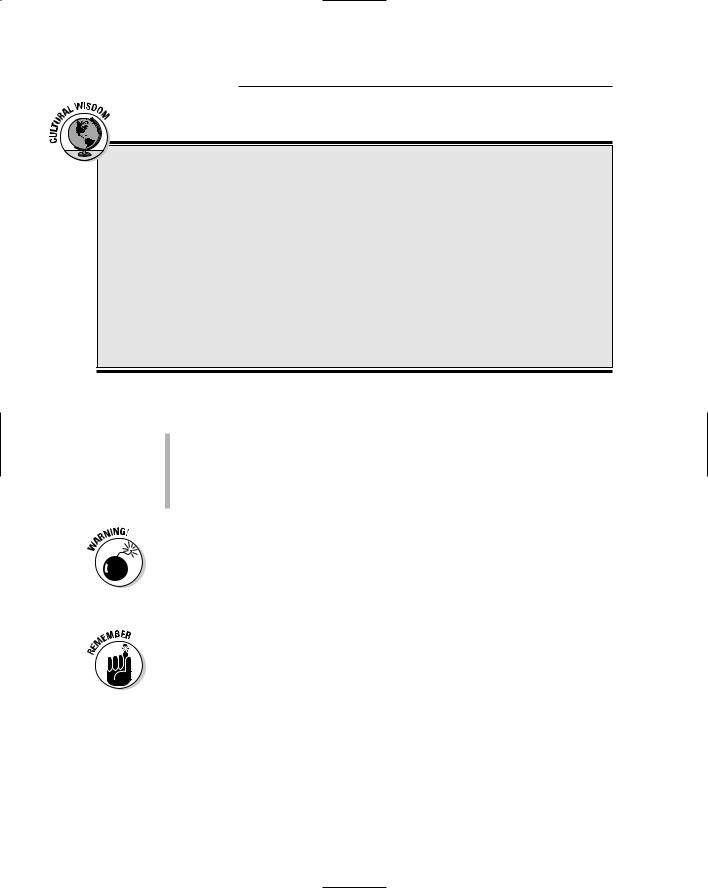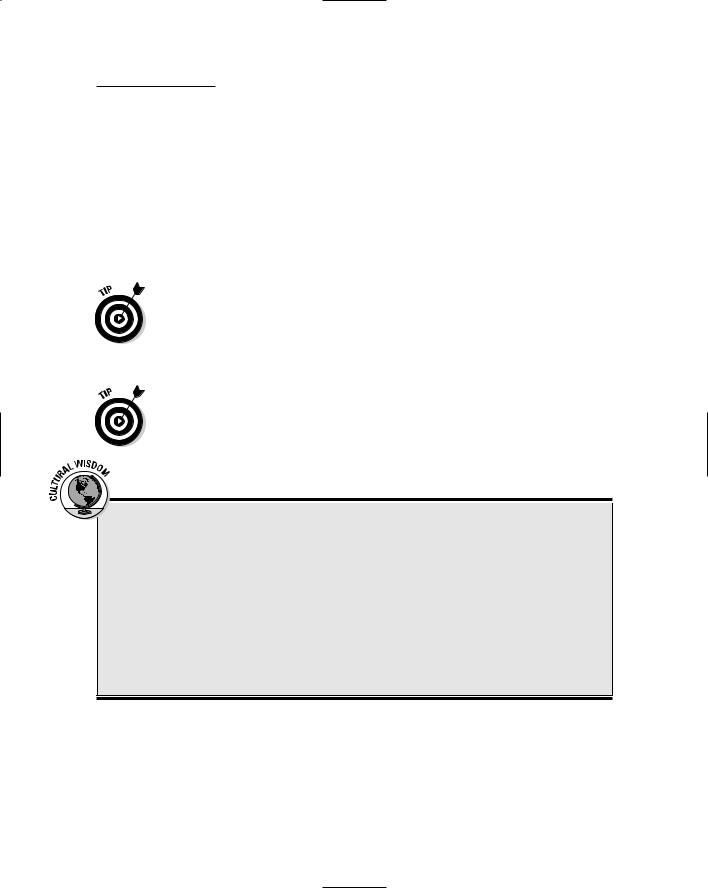
Russian For Dummies
.pdf
64 |
Part I: Getting Started |
Creating composite numbers in Russian is as easy as one, two, three. Say you need to say “one hundred fifty five” in Russian. Translate “one hundred” into sto. “Fifty” in Russian is pyatdyesyat. Five is pyat’. There you go; the number 155 is sto pyatdyesyat pyat’ (stoh pee-dee-syat pyat’). This process also applies to numbers larger than 1,000 (see the next section).
For numbers ending in 1 (such as 121, 341, and so on), the noun following them must be in the nominative case. For numbers ending in 2–4 (122, 453, 794, and so on), the noun following them must be in the genitive singular. For numbers ending in 5–9, the noun following them must be in the genitive plural.
Numbers 1,000–1,000,000
To say 1,000, you may say either just tysyacha (tih-see-chuh) or odna tysyacha (ahd-nah tih-sih-chuh; Literally: one thousand). Starting with 2,000, numbers
in increments of 1,000 going up to 10,000, simply add tysyachi (tih-see-chee; 1,000) or tysyach (tih-seech; 1,000) to the numerals 2–9. The numbers 2,000, 3,000, and 4,000 add tysyachi and 5,000–9,000 add tysyach, as shown in the following list:
1,000 tysyacha (tih-see-chuh)
2,000 dvye tysyachi (dvye tih-see-chee)
3,000 tri tysyachi (tree tih-see-chee)
4,000 chyetyrye tysyachi (chee-tih-ree tih-see-chee)
5,000 pyat’ tysyach (pyat’ tih-seech)
Tysyachi is the genitive singular form and tysyach is the genitive plural form of tysyacha. Notice how 2,000–4,000 require the genitive singular form and 5,000–9,000 require the genitive plural form of tysyacha. That’s because tysycha is treated like a noun, and nouns coming after 2, 3, and 4 must be in the genitive singular case. Nouns coming after 5–9 must be in the genitive plural.
To say 10,000, use the number dyesyat’ (dye-seet’; ten) followed by the word tysyacha in its genitive plural form, tysyach. This rule also applies for numbers beyond 10,000:
10,000 dyesyat’ tysyach (dye-seet’ tih-seech)
50,000 pyatdyesyat’ tysyach (pee-dee-syat tih-seech)
100,000 sto tysyach (stoh tih-seech)
And one really big number is quite simple: 1,000,000 million (mee-lee-ohn).

Chapter 2: The Nitty Gritty: Basic Russian Grammar and Numbers |
65 |
Ordinal numbers
Ordinal numbers are numbers like 1st, 2nd, and 3rd. We list the first 20 here:
pyervyj (pyer-vihy; first)
vtoroj (ftah-rohy; second)
tryetij (trye-teey; third)
chyetvyertyj (cheet-vyor-tihy; fourth)
pyatyj (pya-tihy; fifth)
shyestoj (shees-tohy; sixth)
syed’moj (seed’-mohy; seventh)
vos’moj (vahs’-mohy; eighth)
dyevyatyj (dee-vya-tihy; ninth)
dyesyatyj (dee-sya-tihy; tenth)
odinnadtsatyj (ah-dee-nuht-suh-tihy; eleventh)
dvyennadtsatyj (dvee-naht-suh-tihy; twelfth)
trinadtsatyj (tree-naht-suh-tihy; thirteenth)
chyetyrnadtsatyj (chee-tihr-nuht-suh-tihy; fourteenth)
pyatnadtsatyj (peet-naht-suh-tihy; fifteenth)
shyestnadtsatyj (shees-naht-suh-tihy; sixteenth)
syemnadtsatyj (seem-naht-suh-tihy; seventeeth)
vosyem’nadtsatyj (vuh-seem-naht-suh-tihy; eighteenth)
dyevyatnadtsatyj (dee-veet-naht-suh-tihy; nineteenth)
dvadtsatyj (dvuht-sah-tihy; twentieth)
Russian uses a principle similar to one in English with ordinal numbers higher than 20. You say the first numeral (or numerals) normally (like a cardinal number), with only the final numeral put into ordinal form:
The 21st is dvadtsat’ pyervyj (dvah-tsuht’ pyer-vihy)
The 46th is sorok shyestoj (soh-ruhk shees-tohy)
The 65th is shyest’dyesyat pyatyj (shees-dee-syat’ pya-tihy)
The 177th is sto syem’dyesyat’ syed’moj (stoh syem’-dee-seet’ seed’-mohy)
In Russian, ordinal numbers behave just like adjectives, which means that they always agree in case, number, and gender with the nouns they precede. For more on this subject, see “Always consenting: Adjective-noun agreement” earlier in this chapter.

66 |
Part I: Getting Started |
 Fun & Games
Fun & Games
What’s the nominative singular form of these plural nouns? You can find the answers in Appendix C.
1.komp’yutyery
2.knigi
3.okna
4.koshki
5.magaziny
How many of these Russian numerals can you recognize? Check out the answers in Appendix C.
odin |
dva |
chyetyrye |
vosyem’ |
dvyenadtsat’ |
pyatnadtsat’ |
dvadtsat’ |
sto |
pyat’sot |
tysyacha |
dvadtsat’ tysyach trista sorok syem’
shyest’sot tysyach dyevyanosto odin

Chapter 3
Zdravstvujtye! Privyet! Greetings
and Introductions
In This Chapter
Using informal and formal versions of “you”
Knowing phrases for “hello” and “goodbye”
Making sense of Russian names
Introducing yourself and others
Just as in English, greetings and introductions in Russian are the first steps in establishing contact with other people and making a good first impression.
Greetings and introductions in Russian are a bit more formal than in English. If you greet somebody correctly in Russian, that person is impressed and probably wants to get to know you better. If, however, you botch your greeting, you may get a funny look or even offend the person you’re addressing.
In this chapter, we give you details on how to make your best first impression. We cover the formal and informal versions of “you,” saying “hello” and “goodbye,” understanding Russian names, and introducing yourself and other folks.
To Whom Am I Speaking?
Being Informal or Formal
When you want to say “hello” in Russian, it’s important to know who you’re talking to first. Unlike in English (but similar to French, German, or Spanish, for example), Russian uses two different words for the word “you” — informal ty (tih) and formal vy (vih). (In English, no matter whom you’re talking to — your close friend, your boss, the President of the United States, or your dog — you use the word “you.”)

68 |
Part I: Getting Started |
Showing affection for grandparents
The distinction between ty and vy isn’t only a sign of a formal or an informal situation. Ty also signifies affection. Although grandparents are by definition older people, their grandchildren address them with ty. Maybe this is because of the very special role a Russian babushka (bah-boosh- kuh; grandmother) plays in the Russian family. Traditionally, Russian mothers often leave their children with their mothers, or babushkas. Babushkas often live with their grownup children who already have their own families just to help
them to raise the kids: They feed them, walk them, and take them to or from school — a fulltime job! No wonder the grandchildren use ty in addressing their grandmothers.
Although a grandfather often shares these responsibilities with his wife, his role is considered significantly less important. Nonetheless, the affectionate ty is still used with the word dyedushka (dye-doosh-kuh; grandfather), as well.
Here’s how to know when to use which form of “you”:
In Russian, you’re allowed to use the informal ty only when you’re speaking to your parents, grandparents, siblings, children, and close friends.
The formal vy is used in more formal situations when you talk to your boss, acquaintances, older people, or people you don’t know very well, and anytime you’re speaking to more than one person.
If you’re a young person, you can safely use ty when addressing people your age, such as your classmates. Don’t, however, dare to use ty when talking to your teacher, no matter how young she is! If you use ty in addressing an elderly woman or your teacher, your perhaps very innocent mistake may be taken as extreme rudeness, unless people make allowances for the fact that you’re not a native Russian speaker.
As a rule, you should use the formal vy when addressing somebody you’ve never met before, an official, a superior, or someone who is older than you. As you get to know somebody better, you may switch to the informal ty. You even have a way of asking a person whether he or she is ready to switch to ty: Mozhno na ty? (Mozh-nuh nah tih?; May I call you informal “you?”) If the answer is da! (dah; yes), then you’re free to start calling the person ty. If, however, the answer is nyet! (nyet; no), you better wait until the person feels more comfortable with you!
If you’re at all unsure whether to use vy or ty, use vy until the person you’re addressing asks you to use ty or addresses you with ty.

Chapter 3: Zdravstvujtye! Privyet! Greetings and Introductions |
69 |
Comings and Goings: Saying
Hello and Goodbye
Greetings and goodbyes are essential Russian phrases to know. In the following sections, we show you how to say “hello” in a variety of ways, give you a few greetings to use throughout the day, tell you how to ask and answer to “How are you,” and wrap up a conversation with goodbyes.
Saying hello to different people
To greet one person with whom you’re on informal ty (tih) terms, use the word Zdravstvuj (zdrah-stvooy; hello). To greet a person with whom you’re on formal vy (vih) terms, use the longer word, Zdravstvujtye (zdrah-stvooy- tee; hello). (We cover ty and vy in the previous section.) Note that the first letter “v” in Zdravstvujtye is silent. Otherwise it would be hard even for Russians to pronounce!
Zdravstvujtye is also used to address more than one person. Use it when addressing two or more people even if they’re children, members of your family, or close friends.
The informal way of saying “hello” in Russian is privyet! (pree-vyet) It’s similar to the English “hi,” and you should be on pretty familiar terms with a person before you use this greeting.
Greeting folks at any time of day
You have ways to greet people in Russian, other than the bulky Zdravstvuj or Zdravstvujtye, but how you use these greetings depends on what time of day it is. The most commonly used greetings are in Table 3-1.
Table 3-1 |
Greetings for Different Times of the Day |
|
Greeting |
Pronunciation |
Meaning |
dobroye utro! |
dohb-ruh-ee oo-truh |
Good morning! (This is the greeting you |
|
|
use in the morning — until noon.) |
|
|
|
dobryj dyen’! |
dohb-rihy dyen’ |
Good afternoon! (This is the greeting |
|
|
you can use most of the day, except for |
|
|
early in the morning or late at night.) |
|
|
|
dobryj vyechyer! |
dohb–rihy vye-cheer |
Good evening! (This is the greeting you |
|
|
would most likely use in the evening.) |
|
|
|

70 |
Part I: Getting Started |
Note that Russians use these expressions only as greetings but not at leavetaking. (See “Taking your leave,” later in this chapter for details on goodbyes.) You can also use these expressions without giving any thought to whether the person you greet should be addressed with ty or vy. No matter whom you greet, you can safely use any of these phrases.
Handling “How are you?”
The easiest and most popular way to ask “How are you?” is Kak dyela? (kahk dee-lah) You use this phrase in rather informal settings, like at parties, meeting a friend on the street, or talking on the phone.
A more formal way to ask “How are you?” is Kak vy pozhivayetye? (kahk vih puh-zhih-vah-ee-tee) You use this phrase when speaking with your boss, your professor, or somebody you’ve just met.
You won’t offend anyone in a formal setting if you say Kak dyela?, but you’re better off sticking to Kak vy pozhivayete? Russians tend to err on the side of more formality rather than less.
A word of caution. In the English-speaking world, “How are you?” is just a standard phrase often used in place of a greeting. The person asking this formulaic question doesn’t expect to get the full account of how you’re actually doing. But in Russia it’s different. They want to know everything! When they ask you how you’re doing, they are in fact genuinely interested in how you’re doing and expect you to give them a more or less accurate account of the most recent events in your life.
How should you reply to Kak dyela? Although optimistic Americans don’t hesitate to say “terrific” or “wonderful,” Russians usually respond with a more reserved Khorosho (khuh-rah-shoh; good) or Normal’no (nahr-mahl’- nuh; normal or okay), or even a very neutral Nichyego (nee-chee-voh; so-so, Literally: nothing) or Nyeplokho (nee-ploh-khuh; not bad).
If you’re truly feeling great, go ahead and answer pryekrasno! (pree-krahs- nuh; wonderful), or vyelikolyepno! (vee-lee-kah-lyep-nuh; terrific). But beware that by saying “terrific” or “wonderful,” you’re putting your Russian friend on guard: Russians know all too well that life is not a picnic. To a Russian, wonderful and terrific events are the exception, not the rule. To be on the safe side, just say either Nichyego or Nyeplokho.
And don’t stop there! Be sure to ask the person how she’s doing. You simply say A u vas? (ah oo vahs; and you?; formal) If you want to be less formal, you say A u tyebya? (ah oo tee-bya; and you?)

Chapter 3: Zdravstvujtye! Privyet! Greetings and Introductions |
71 |
Taking your leave
The usual way to say goodbye in almost any situation is Do svidaniya! (duh svee-dah-nee-ye), which literally means “Till (the next) meeting.” If you’re on informal terms with somebody, you may also say Poka (pah-kah; ’bye or see you later).
The phrase you use while leave-taking in the evening or just before bed is Spokojnoj Nochi (spah-kohy-nuhy noh-chee; Good night). The phrase works both for formal and informal situations.
Talkin’ the Talk
Sasha bumps into her classmate Oleg on the subway. Sasha is just about to get off.
Oleg: |
Sasha, privyet! |
|
sah-shuh, pree-vyet! |
|
Sasha, hi! |
Sasha: |
Oj, Olyeg! Privyet! Kak dyela? |
(pleasantly |
ohy, ah-lyek! pree-vyet! kahk dee-lah? |
surprised) |
Oh, Olyeg! Hi! How are you? |
Oleg: |
Nichyego. A u tyebya? |
|
nee-chee-voh. ah oo tee-bya? |
|
Okay. And you? |
Sasha: |
Nyeplokho. Oj, eto moya stantsiya. Do svidaniya, |
|
Olyeg. |
|
nee-ploh-khuh. ohy, eh-tuh mah-ya stahn-tsih-ye. duh |
|
svee-dah-nee-ye, ah-lyek. |
|
Not bad. Oh, this is my station. Goodbye, Olyeg. |
Oleg: |
Poka! |
|
pah-kah! |
|
Bye! |
|
|

72 |
Part I: Getting Started |
Words to Know
privyet |
pree-vyet |
hi |
Kak dyela? |
kahk dee-lah |
How are you? |
nichyego |
nee-chee-voh |
okay |
A u tyebya? |
ah oo tee-bya |
And you? |
nyeplokho |
nee-ploh-khuh |
not bad |
do svidaniya |
duh svee-dah-nee-ye |
goodbye |
poka |
pah-kah |
’bye |
Not So Simple: Deciphering
Russian Names
The Russian word “name” is imya (ee-mye), but you may not hear this word when people ask about your name. That’s because what they actually ask is not “What is your name?” but literally, “How do people/they call you . . . ?” — Kak vas/tyebya zovut? (kahk vahz/tee-bya zah-voot) Consequently, when you answer the question, you say how people in fact call you — Myenya zovut Dzhon (mee-nya zah-voot dzhohn; My name is John, Literally: They call me John).
Saying names in Russian is a bit more complicated than in English. The reason is that in introducing themselves, especially in formal situations, Russians use the patronymic (patronymic means father’s name) right after the first name. The patronymic usually has the ending -vich (veech), meaning “son of,” or -ovna (ohv-nuh), meaning “daughter of.” For example, a man named Boris, whose father’s name is Ivan, would be known as Boris Ivanovich (Ivanovich is the patronymic). A woman named Anna whose father’s name is Ivan would be known as Anna Ivanovna (Ivanovna is the patronymic). A Russian almost never formally addresses a person named Mikhail as just “Mikhail” but rather as “Mikhail” plus his patronymic with the suffix -vich (for instance, “Mikhail Nikolayevich” or “Mikhail Borisovich”).

Chapter 3: Zdravstvujtye! Privyet! Greetings and Introductions |
73 |
You may say that Russians have three names. The first name is a baptismal name; the second name is his or her father’s name with the ending -vich for men, or -ovna for women; and the third is the last name, or the family name.
Men’s last names and women’s last names have different endings. That’s because Russian last names have genders. Although most Russian male last names have the ending -ov (of), female names take the ending -ova (ohv-nuh). Imagine that your new acquaintance, Anna Ivanovna Ivanova, is a married woman. Her husband’s last name isn’t Ivanova (ee-vuh-noh-vuh), but Ivanov (ee-vuh-nof).
No matter what your relation is to another person (either informal or formal), you can still address that person by his or her first name and patronymic. So if you’re unsure whether you’re on ty or vy terms with someone, go ahead and address the person by the first name and patronymic just to be safe. When you’re clearly on friendly terms with the person, you can switch to using the first name only.
In everyday conversation Russians almost never use words like Mr., Mrs., Ms., and Miss. Russians use these kinds of titles only in extremely formal situations, such as in government proceedings or in legal contracts. In such situations you may hear somebody referred to as Gospodin Putin (guhs-spah-deen poo-teen; Mr. Putin) or Gospozha Gorbachyova (guhs-pah-zhah guhr-buh-choh-vuh; Mrs. Gorbachev).
Playing the Russian nickname game
By the way, what does Mr. Ivanov call his wife (whose name is Anna)? Most likely, he uses the diminutives Anya, Anechka, Anyuta, or Annushka. Russians are extremely ingenious in creating new diminutives and are constantly changing them even when addressing one and the same person. This is one of the reasons why Americans sometimes find it difficult to read Russian novels. While it seems that new
characters are constantly being introduced by the author, the fact is that in many cases it’s an old character with a new diminutive version of her name! For example, Ekatyerina Shchyerbatskaya, a famous character from Leo Tolstoy’s Anna Karyenina, is sometimes affectionately called by the diminutives, Katyenka, Katiusha, and Kitty. No wonder Russian novels are so long!
